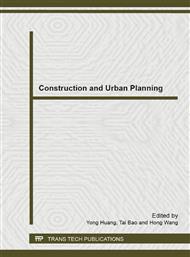p.2180
p.2185
p.2189
p.2193
p.2198
p.2203
p.2208
p.2214
p.2219
Fusion Study on Architecture Feng-Shui Theory and Ecological Architecture of Edong Ancestral Hall
Abstract:
The development of ecological architectural theory in China and the revival of traditional feng-shui theory have become a huge driving force for the development of eco-building today. In this paper a comparative study of ancestral halls in east Hubei province is made from the perspective of building orientation, topography, building space and building materials and other elements related to both eco-building and feng-shui theory and a conclusion is reached that the essence of feng-shui theory is consistent to the ideology of contemporary ecological architectural theory, which the author hopes will provide some references and a scientific basis for the sustainable development of ecological buildings with Chinese characteristics in China.
Info:
Periodical:
Pages:
2198-2202
Citation:
Online since:
March 2013
Authors:
Keywords:
Price:
Сopyright:
© 2013 Trans Tech Publications Ltd. All Rights Reserved
Share:
Citation:


